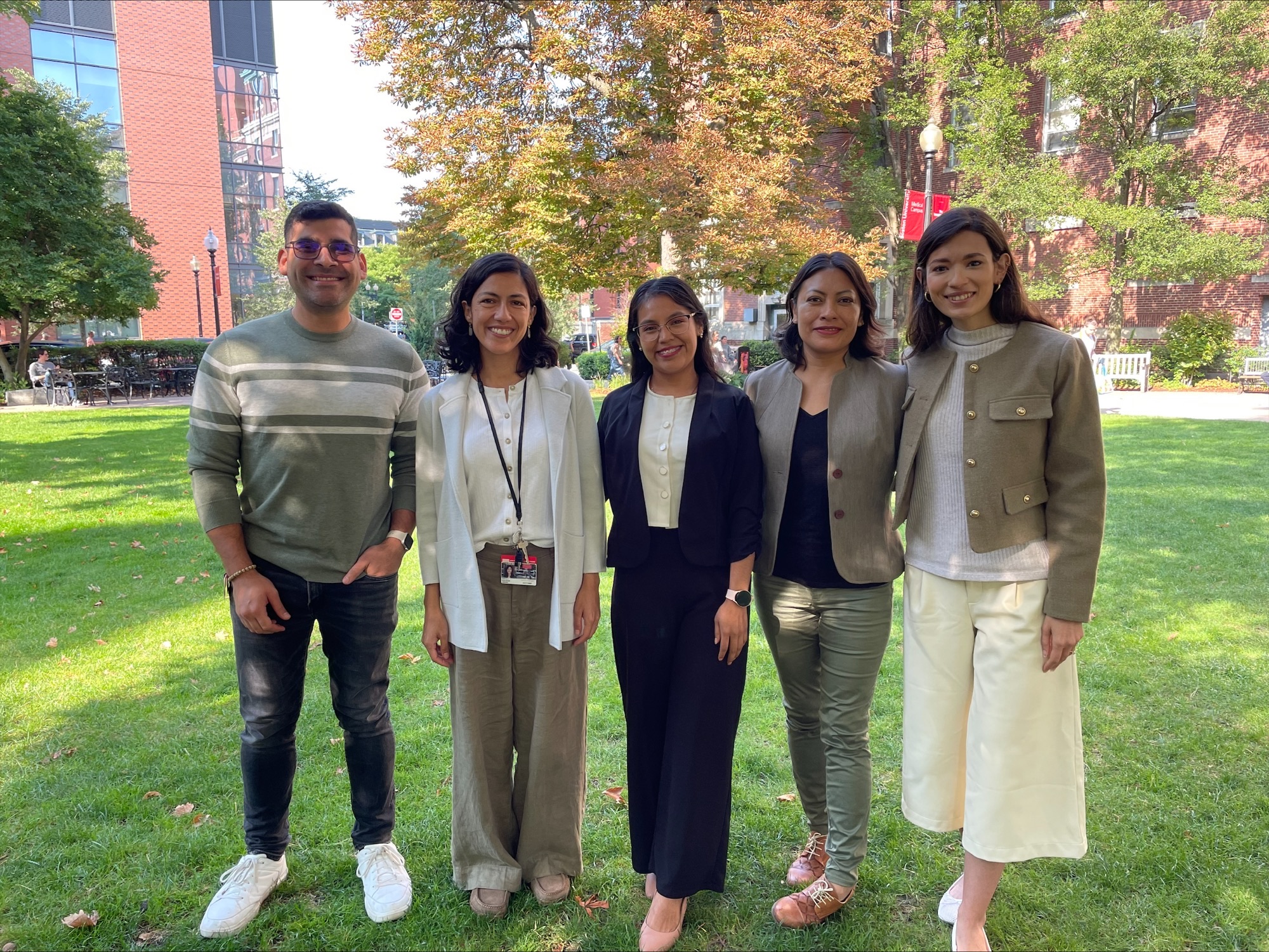SPH Promotes Latino Scholarship in Epidemiology.

SPH Promotes Latino Scholarship in Epidemiology
Marcia Pescador Jimenez, with support from the Department of Epidemiology, launched the Latino Epidemiology Alliance Development (LEAD) initiative, offering a two-week-long summer research intensive and internship opportunities for Latino graduate students and early career researchers to increase Latino representation in epidemiology.
From left: Marco Chivardi, project coordinator in the Department of Epidemiology, and Marcia Pescador Jimenez, assistant professor of epidemiology, with LEAD initiative scholars, Teofila Enriquez Almaraz, Ana Lilia Lozada Tequeanes, and Sirena Gutierrez, on Talbot Green last fall. (Photo courtesy of Marcia Pescador Jimenez)
Guided by the vision and leadership of Marcia Pescador Jimenez, assistant professor of epidemiology, the Department of Epidemiology launched the Latino Epidemiology Alliance Development (LEAD) initiative this past summer. Consisting of a two-week-long summer research intensive and internship opportunities throughout the academic year, the program aims to support the scholarship of Latino graduate students and early career researchers, increasing Latino representation in the field of epidemiology.
The American College of Epidemiology and Society of Epidemiologic Research (SER) have both recently called for greater representation of Latino epidemiologists in public health, noted Pescador Jimenez and her colleagues in their proposal for the educational alliance. While Latinos are the largest subpopulation of older adults in the US, just 6% of SER’s 2018 membership identified as Latino. To address the language and cultural barriers, lack of access to preventative care, and greater risk of going uninsured faced by Latino Americans, Pescador Jimenez and her colleagues advocate that the field of public health needs more Latino researchers.
Through her own research on environmental determinants of Alzheimer’s disease and related dementias, Pescador Jimenez works to shine a light on racial and ethnic health disparities. She hopes that the LEAD initiative will result in further development of novel research questions and grant applications on how to improve Latino health, and she foresees the program fostering cross-disciplinary collaborations that could help the School of Public Health tackle its strategic goal of reducing health inequities.
“The motivation [for creating the program] was to address the educational needs of US-based and Mexico-based Latino epidemiology students seeking to deepen their expertise and learn novel methodological approaches,” says Pescador Jimenez. The LEAD initiative aims to provide opportunities for Latino students who may not have the same resources as other students, she says, such as English proficiency. Language should not act as a barrier to the infusion of new knowledge into Latino epidemiological studies, says Pescador Jimenez.
“When I was a master’s student and PhD student, I was the only Latina in the department,” recalls Pescador Jimenez. “I didn’t want that to happen to students [today], so what I am trying to do is to increase the representation of Latinos studying Latino health. Their inclusion is important because they have knowledge of the Latino culture and can incorporate that knowledge into research. Suppose you just run a linear regression and try to examine what [factors] affect Latinos—there is more to it than that. It is also [about] understanding what the science tells us, understanding what the results we are getting mean and what that might mean to the community.”
Three students participated in LEAD-sponsored internships during fall 2024, including US-based doctoral student in epidemiology Sirena Gutierrez, Mexico-based MPH student Teofila Enriquez, and early career researcher Ana Lozada Tequeanes. The LEAD scholars contributed to research projects alongside Pescador Jimenez, as well as Maria Glymour, chair and professor in the Department of Epidemiology, who, as principal investigator on a study following a multi-ethnic cohort of older adults in Northern California, contributes a wealth of expertise on how social factors across the life-course, from infancy to adulthood, influence health outcomes in old age.
The LEAD scholars also had the opportunity to attend seminars and meet experts from a variety of departments at SPH, including Gregory Wellenius and Patricia Fabian from the Department of Environmental Health, Carlos Rodriguez-Diaz from the Department of Community Health Sciences, and Leonardo Martínez from the Department of Epidemiology.
Initiatives like LEAD are often overlooked, viewed as something people do in their spare time without funding, says Glymour. “When the LEAD program brought three wonderful scholars to SPH, I was absolutely delighted. They were a joy to have as visitors and their projects were each very impressive. I really wanted [Pescador Jimenez’s] work to be recognized and elevated. She has the expertise and determination to overcome many barriers to help her mentees succeed. My hope is that we can nourish and grow the LEAD program in the future.”
Pescador Jimenez and Glymour are currently working to secure a sustainable source of funding to continue offering the LEAD program this upcoming summer and beyond.

Comments & Discussion
Boston University moderates comments to facilitate an informed, substantive, civil conversation. Abusive, profane, self-promotional, misleading, incoherent or off-topic comments will be rejected. Moderators are staffed during regular business hours (EST) and can only accept comments written in English. Statistics or facts must include a citation or a link to the citation.